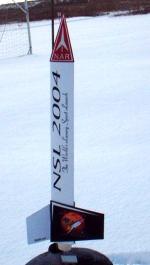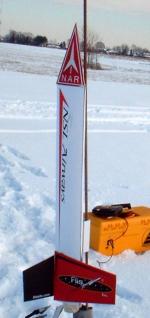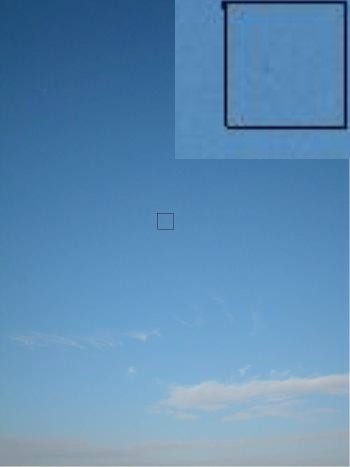| Construction Rating: | starstarstarstarstar |
| Flight Rating: | starstarstarstarstar_border |
| Overall Rating: | starstarstarstarstar_border |
| Manufacturer: | FlisKits  |

Brief:
This was a special edition of the standard Caution paper rocket, commemorating
the 2004 National Sport Launch. I downloaded it from the NSL site that year,
and have been waiting for the right occasion and motivation to build it. Thanks
to the 2005 EMRR challenge, I found both on a "snow day" in mid
December.
Construction:
This was a great little project to do in a couple of hours when I was snowed in
under about 8 inches of fresh ice and snow. The parts list is a couple of
sheets of cardstock, which you then convert into a body tube, 3 fins, launch
lug, and a nose cone. The pattern even includes a spare nose cone.
Kyle Hancock's review plus the tips that have already been posted do an excellent job of detailing the construction, so I won't replicate those details. I do think the most noteworthy point brought out in that review was that this is a triangular folded body, not a rolled tube, and that makes the construction and fit go much better (and it's simpler).
 I followed the
standard construction techniques, and wound up using clay for nose weight.
I followed the
standard construction techniques, and wound up using clay for nose weight.
Finishing:
Since the patterns print out already colored, there's really no finishing
necessary. I was planning on flying in the snow, though, and fearing running
colors I elected to apply 3 very light coats of Krylon clear coat. In addition
to protecting the finish, this also provided a glossy finish that I hadn't been
able to get off my inkjet paper on cardstock. I think the gloss, particularly
with the red and black trim, was an excellent improvement.
Construction Rating: 5 out of 5
Flight:
I had previously lost my standard Caution rocket to a C6 flight that completely
disappeared out of sight, so in order to make sure I got my 3 required flights
in, I went wimpy with A8-3's. This is a good motor choice for this rocket, and
conversely this rocket makes a nice vehicle to use up those A8-3's that tend to
build up whenever I pick up Estes Blast-Off Flight Packs.

The A8-3's took it up a couple hundred feet on the breezy (10-15 mph) day, with only a slight weathercock. Deployment was slightly early, but not enough to warrant going to a 5 delay. I used a ribbed mylar streamer from a party store, roughly 2x20, which sloweds it down just enough to prevent damage, plus the bright red is easier to spot in the sky than this fairly small paper rocket.
Recovery:
This is simply a great flyer on smaller impulse motors. The only I could offer,
which is a bit of a stretch, is that the cardstock fins bend or warp easily, so
my flights have picked up a slight spin to them over time.
Flight Rating: 4 out of 5
Summary:
For a paper rocket, you really can't beat this. Quick and easy to build, flies
fine on inexpensive motors, and best of all is the price (free on the Fliskits
website). I don't think this particular version is available any longer, but
I'm sure there will be other editions coming out in the future.
Overall Rating: 4 out of 5
Other Reviews
- FlisKits Caution Rocket By Kyle Hancock
Brief: This rocket is a single-staged, streamer recovery rocket that is made entirely from cardstock. It's unique triangular body tube make this a Level 1 kit. Most cardstock rockets require precise rolling and bending, making them too hard for younger modelers. With only straight folds, this rocket can easily be done by a small child. Construction: Everything you need to build ...
 |
 |
Flights
 |
 |
LU (March 5, 2007)
Sponsored Ads
 |
 |












C.D.C. (July 2, 2004)